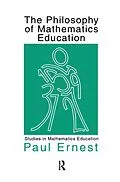First published in 1991. What is mathematics, and how can we account for its nature? What philosophies of mathematics have been developed? What philosophical assumptions, possibly implicit, underpin the learning of mathematics? What are the aims of mathematics education and are they valid? What philosophical assumptions, possibly implicit, does mathematics teaching rest on? This study looks at these questions on the philosophy of mathematics.
Autorentext
Paul Ernest
Zusammenfassung
First published in 1991. Routledge is an imprint of Taylor & Francis, an informa company.
Inhalt
Introduction, Rationale, The Philosophy of Mathematics Education Part 1 The Philosophy of Mathematics 1 A Critique of Absolutist Philosophies of Mathematics 2 The Philosophy of Mathematics Reconceptualized 3 Social Constructivism as a Philosophy of Mathematics 4 Social Constructivism and Subjective Knowledge 5 The Parallels of Social Constructivism Part 2 The Philosophy of Mathematics Education 6 Aims and Ideologies of Mathematics Education 7 Groups with Utilitarian Ideologies 8 Groups with Purist Ideologies 9 The Social Change Ideology of the Public Educators 10 Critical Review of Cockcroft and the National Curriculum 11 Hierarchy in Mathematics, Learning, Ability and Society 12 Mathematics, Values and Equal Opportunities 13 Investigation, Problem Solving and Pedagogy
